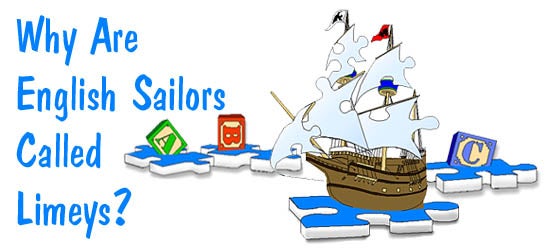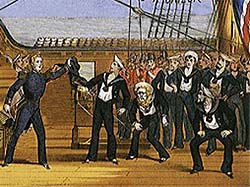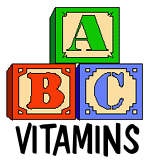
Illustrated by: CJ Kazilek
The story behind scurvy
Imagine you are on a sailing ship in 1747. You left England only a couple of months ago and you felt fine. Now you are so tired you can barely walk. Your gums are swollen and so sore it hurts when you are eating. Your teeth are falling out. When you look at your legs you notice they are swollen and purple from bruising.

Lucky for you, a passenger on your ship is very interested in your condition. His name is Dr. James Lind. Dr. Lind wants to discover what is causing you so much pain that you can't work. After examining all the sailors on the ship he finds 11 more sailors that feel the same as you do. Dr. Lind divides you into six groups with two sailors in each group. On May 20, 1747 he is ready to begin the first clinical nutrition experiment.
How did Lind conduct his experiment?
Dr. Lind hypothesized that something was missing from the diet of all the sailors who were sick. By giving each group different treatments he hoped to locate what was missing from the diet of you and your fellow sailor's. Here is a list of what Dr. James Lind gave each group:
- group 1 drank one quart of cider a day
- group 2 gargled with sulfuric acid
- group 3 had two spoonfuls of vinegar, 3 times a day
- group 4 drank 1/2-pint seawater a day
- group 5 drank barley water
- group 6 (you & another sailor) ate two oranges and 1 lemon a day
What happened during Lind's experiment?
Only you and the other lucky sailor who ate the oranges and lemon felt better. In fact, in only six days you felt great and were able to start working again. The other sailors in the experiment felt worse.
This is a real story. Dr. Lind had discovered the missing nutrient in your diet. Can you guess what made you feel better? If you guessed that it was from the vitamin C in the oranges and the lemon you ate, you are correct! The disease you and your fellow sailors were suffering from is scurvy. Scurvy is a disease caused by a vitamin C deficiency.

When the sailors began their voyage they had fresh fruits and vegetables on their ship. Fruits and vegetables are hard to keep fresh, so the sailors had to eat them right away. If the sailors were at sea for many months they would not have fruits and vegetables for most of this time.
Why were limes added to Royal Navy sailors diet?
Scurvy was a huge problem for English sailors in the 1600s and 1700s. Because of what Dr. James Lind discovered, the Royal Navy made sure that all sailors had lemon juice to drink when they were at sea for longer than one month. The sailors thought that it was the acid content of the lemon juice that cured scurvy (vitamin C is also called ascorbic acid). Doctors thought that lime juice would work better because it has more acid than lemon juice, so they substituted lime juice for lemon juice on the English Royal Navy ships.
And that is how the English sailors became known as Limeys! Since that time the word has been used as a negative slang term to describe British Nationals, and is therefore not considered a polite word to use.
Do people still get scurvy?
If you think scurvy is a disease of the past, or maybe only in developing countries, think again. Three studies done at Arizona State University showed that approximately 3 percent of the students had blood vitamin C levels indicating scurvy. This means over 3,000 students have indications of scurvy. Another study of 500 outpatients revealed 6 percent had a similar vitamin C deficiency. Finally, National Health and Nutrition examination Scurvy (NHANES Ill) reported 13 percent of US adult males and 9 percent of American adult females have blood vitamin C levels indicating scurvy. That's over fifty million American adults. It turns out that a balanced diet that includes fruits and vegetables is important for everyone.
Additional images from Wikimedia by NotFromUtrecht.
Read more about: Why Are English Sailors Called Limeys?
Bibliographic details:
- Article: Why Are English Sailors Called Limeys?
- Author(s): Corinne Corte
- Publisher: Arizona State University School of Life Sciences Ask A Biologist
- Site name: ASU - Ask A Biologist
- Date published:
- Date accessed:
- Link: https://askabiologist.asu.edu/explore/sailors-called-limeys
APA Style
Corinne Corte. (). Why Are English Sailors Called Limeys?. ASU - Ask A Biologist. Retrieved from https://askabiologist.asu.edu/explore/sailors-called-limeys
Chicago Manual of Style
Corinne Corte. "Why Are English Sailors Called Limeys?". ASU - Ask A Biologist. . https://askabiologist.asu.edu/explore/sailors-called-limeys
Corinne Corte. "Why Are English Sailors Called Limeys?". ASU - Ask A Biologist. . ASU - Ask A Biologist, Web. https://askabiologist.asu.edu/explore/sailors-called-limeys
MLA 2017 Style

How the simple lime became an important part of a sailors diet.
Be Part of
Ask A Biologist
By volunteering, or simply sending us feedback on the site. Scientists, teachers, writers, illustrators, and translators are all important to the program. If you are interested in helping with the website we have a Volunteers page to get the process started.


